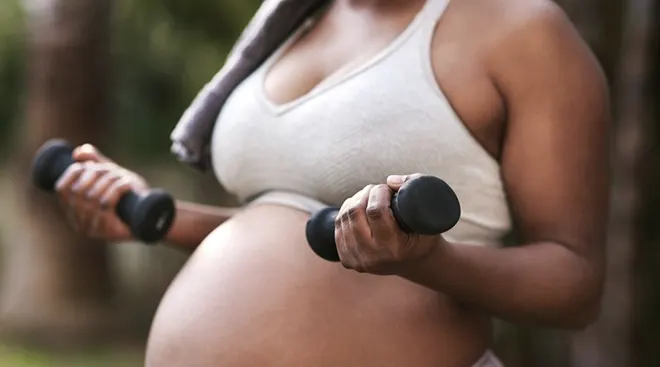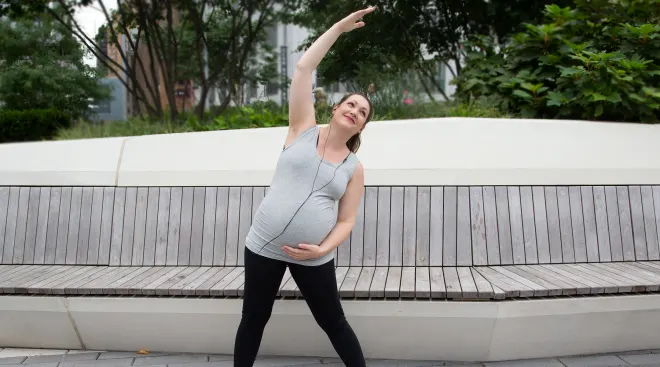Can You Run While Pregnant?
If you’re a runner, you might wonder if it’s safe to continue your exercise routine while pregnant. The answer is slightly complicated: Running while pregnant is generally safe, but there are a few things to keep in mind before lacing up your shoes and heading out the door. So can you run while pregnant or should you opt for a slower pace? Read on for the benefits, risks and more.
Experts say that running while pregnant is generally considered safe—provided you were already a runner before you became pregnant. “Unless a woman is high-risk or has other anatomic issues to worry about, running is fine for women during pregnancy, assuming she has been running,” says Jim Pivarnik, PhD, a kinesiology professor at Michigan State University and a researcher on pregnancy and physical activity. “I wouldn’t recommend starting a [new] running program during pregnancy.”
The American College of Obstetricians and Gynecologists (ACOG) recommends that women with uncomplicated pregnancies “engage in aerobic and strength-conditioning exercises before, during and after pregnancy.” When it comes to running during pregnancy, ACOG notes: “If you are an experienced runner, jogger or racquet-sports player, you may be able to keep doing these activities during pregnancy,” adding that you should discuss your routine with your healthcare provider.
Ultimately, it’s best to have a conversation with your provider about whether it’s safe for you to continue running while pregnant, says Ashley Rawlins, PT, DPT, a pelvic and obstetric physical therapist and clinical educator at Origin.
Running during pregnancy is good for you in many ways—here’s what the experts say.
- It supports heart health. Running is an aerobic activity that works your cardiovascular system, says Andrew Rubenstein, MD, director of the division of general obstetrics and gynecology at New York University Langone Health.
- It helps you stay fit. “Assuming the woman is already running, keeping it up during pregnancy will help her maintain her fitness throughout gestation,” Pivarnik says.
- It can boost your mental health. Rubenstein says that running can help support your mental health. If you’ve ever felt a “runner’s high”—when your body releases feel-good hormones—you probably agree.
- It can help your body prepare for labor. Staying in shape through regular exercise—like running—can help you feel stronger and more energized for labor and delivery, Rubenstein says.
While running during pregnancy has its perks, there are a few potential drawbacks to consider.
- There is a risk of falling. This is one of the biggest concerns that experts have. “Your center of gravity changes, making you more prone to balance issues,” Rubenstein says. “You could potentially hit a pothole and fall, or just fall in general.”
- You could overheat. Overheating is a potential concern in any exercise during pregnancy, but Pivarnik says it’s also something to consider with running, especially given that it’s a more intense exercise.
- You might develop orthopedic issues or other injuries. Pregnancy can cause a change in your gait, and that can lead to orthopedic issues with your knees and ankles, Pivarnik says. “If this starts to happen, stop running,” he adds. But there’s also a chance of injury in general, Rubenstein says. “I don’t care how professional you are…there’s a chance of injury,” he says. “Those ligaments and tendons start to loosen.”
Experts generally don’t recommend taking up a running routine if you haven’t done it before. But if you were a runner before you became pregnant, Rubenstein says you can keep it up—provided you don’t overexert yourself. “I tell people this isn’t the time to train for a marathon,” he says.
It’s also best for moms-to-be and pregnant people with certain pregnancy complications like bleeding and placental issues to avoid running, Rubenstein adds.
There are a few things to keep in mind if you plan on running during pregnancy. Rubenstein recommends listening to your body—and your doctor. “As the gestation increases, you may need to switch to something else,” he says.
Pivarnik agrees. “I have known women who keep it up, with OB permission, very close to their delivery date,” he says. But, he adds, “most tend to feel uncomfortable running [into the] late third trimester.”
Rawlins also recommends being open to tweaking your workout routine over time. “You’ll likely need to modify your running routine as your pregnancy progresses,” she says. “For example, adjusting your distance and/or pace as needed.”
Some pregnant runners find it helpful to lean forward slightly while running and to take slightly shorter strides, Rawlins says. “These slight adjustments in your running form may help reduce ground reaction forces—or impact through your body—that can impact your pelvic floor while running,” she adds.
Overall, experts stress the importance of listening to your body before, during and after you run. If you experience any issues, including bleeding or fluid leaking from your vagina, dizziness, fainting, chest pain, headache, muscle weakness that impacts your balance, calf pain or swelling and regular, painful contractions, Rawlins recommends that you stop running and call your doctor.
Frequently Asked Questions
Can I start running while pregnant?
No, it’s not recommended that you start a running routine while pregnant. “My constant mantra is, were you doing it before pregnancy—whatever ‘it’ is—and is your OB good with it?” Pivarnik says. However, if you were a runner before your pregnancy, you should be just fine to continue if you feel up for it, he says.
Is marathon running while pregnant safe?
There have been some stories of moms running marathons during pregnancy, but Rubenstein says these are “one-offs.” Pivarnik agrees. “There have been very isolated stories of women competing in a marathon while pregnant,” he says. “This is extremely rare, and most OBs would not approve.”
Is running bad for your pelvic floor?
It depends. “Whether or not running is ‘bad’ for your pelvic floor when you’re pregnant can depend on a variety of factors,” Rawlins says. “It can depend on things like your prior level of activity, your health before and during pregnancy, any preexisting pelvic floor issues or your specific body changes during pregnancy.” There also isn’t any research that looks at how running specifically impacts the pelvic floor during pregnancy, she adds.
However, Rawlins says that running during pregnancy may increase your risk of having issues with your pelvic floor. “Both high-impact exercise like running and pregnancy are risk factors for pelvic floor dysfunction,” she says. “And female athletes are more likely to experience urinary incontinence.”
Still, Rawlins stresses that “running is not universally bad for your pelvic floor. With proper precautions, training and awareness, many folks can continue to enjoy the benefits of running while maintaining pelvic floor health.”
Can you do sprints during pregnancy?
You’re probably okay to do sprints early in pregnancy, but Pivarnik doesn’t recommend sprinting as the pregnancy progresses. “It’s probably not worth the risk of falling or causing an anatomic issue, given that sprinting is very tough on leg and hip muscles generally,” he says.
If you’re already a runner, you should be good to go if you want to continue running during pregnancy. But no matter what, it’s always a good idea to check in with your healthcare provider about your pregnancy exercise routine.
Please note: The Bump and the materials and information it contains are not intended to, and do not constitute, medical or other health advice or diagnosis and should not be used as such. You should always consult with a qualified physician or health professional about your specific circumstances.
Plus, more from The Bump:
Jim Pivarnik, PhD, MS, MSc, is a kinesiology professor at Michigan State University and a researcher on pregnancy and physical activity. He earned a PhD in human performance with a concentration in exercise physiology from Indiana University.
Ashley Rawlins, PT, DPT, is a pelvic and obstetric physical therapist and clinical educator at Origin. She specializes in the treatment of pelvic floor muscle dysfunctions.
Andrew Rubenstein, MD, is the director of the division of general obstetrics and gynecology at New York University Langone Health. He earned his medical degree from Hahnemann University.
American College of Obstetricians and Gynecologists, Physical Activity and Exercise During Pregnancy and the Postpartum Period, April 2020
American College of Obstetricians and Gynecologists, Exercise During Pregnancy, March 2022
Johns Hopkins Medicine, The Truth Behind ‘Runner’s High’ and Other Mental Benefits of Running
Frontiers in Physiology, High-Low Impact Exercise Program Including Pelvic Floor Muscle Exercises Improves Pelvic Floor Muscle Function in Healthy Pregnant Women – A Randomized Control Trial, January 2019
BJOG: An International Journal of Obstetrics and Gynaecology, High Impact Exercise May Cause Pelvic Floor Dysfunction: FOR: Scale, Strengthen, Protect!, March 2018
Learn how we ensure the accuracy of our content through our editorial and medical review process.
Navigate forward to interact with the calendar and select a date. Press the question mark key to get the keyboard shortcuts for changing dates.
Advertisement
Advertisement
Advertisement
Advertisement




















































